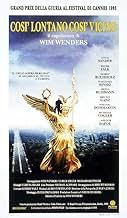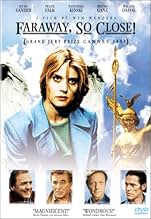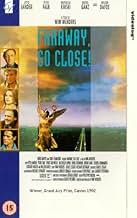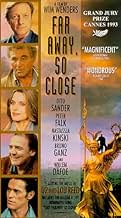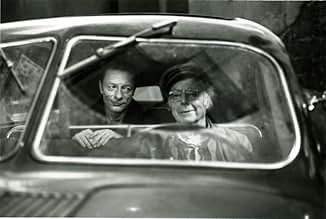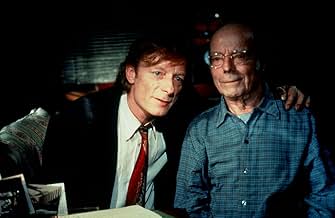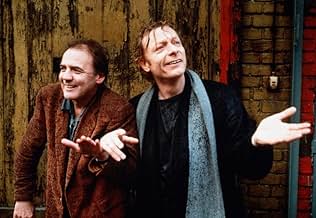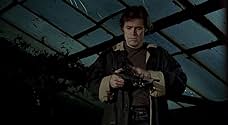Un grupo de ángeles observa con anhelo la vida de los seres humanos en la capital de Alemania.Un grupo de ángeles observa con anhelo la vida de los seres humanos en la capital de Alemania.Un grupo de ángeles observa con anhelo la vida de los seres humanos en la capital de Alemania.
- Dirección
- Guionistas
- Elenco
- Premios
- 4 premios ganados y 7 nominaciones en total
- Mikhail Gorbachev
- (as Michail S. Gorbatschow)
Opiniones destacadas
Cinema has produced many wonderful films over the past century or so, but when looking at the various elements of film combined here, there is no other movie which touches me quite so positively, quite as deeply as this one.
This movie makes a genius use of fantasy to analyze our lives. Its main message is : "We (the angels) are not the message. We are the messengers and the message is love".
The basic story has to do with the protagonist as Cassiel, the actor Otto Sander, taking human form from his previous angelic state in which he can only observe and sympathize. An event propels his wishful transformation into the human dilemma. Wim Wenders said that this film was a continuation of "Wings of Desire" and not a sequel. It is probably splitting hairs because I do not readily understand the difference, if any. Nastassja Kinski has the major supporting role of Raphaela and is always shown in black and white. Raphaela becomes Cassiel's, always present, angel. It is a very difficult role to pull off because Nastassja only has her voice (in German), her facial expressions, her hands, and her body movements to bring her character to life. Her on screen presence appears natural and effortless. It is nothing less than a superb performance of a first rate actress. But it is up to Otto Sander to carry the movie. The supporting cast is first rate.
My third viewing of the film was an experience. 146 minutes passes relatively quickly. The film is dripping with intensity and is larger than life. Wim Wenders' vision and its execution is astonishing and will reverberate through time because it captures the essence of life and death. It is a movie director's awesome tour de force.
Great cast as well. Check out Horst Bucholz (sp?) here and in the 1962 comedy "One, Two, Three" with James Cagney. All the "mortals", especially Bruno Ganz, seem almost gleeful. Only Willem Dafoe appears to be in a "serious German movie".
I may not be qualified to comment on the real value of this movie because "Wings of Desire" is in my permanent top 5. It probably benefits from the glow of it's precursor more than any other sequel, because I really wanted to catch up with these characters. I smiled every time I saw a familiar face.
That said, it takes about an hour to settle in but finally gets sort of serious. Watching this and "Until the End of The World" (also ripped by critics) I get the feeling Wenders was either being lazy or just freestyling to avoid boredom. Looks like fun from here.
Near the end of the other movie, we saw one of the angels, Damiel, become human for the love of a beautiful trapeze artist. In this film, we see the other angel, Cassiel, become human by accident as he wanted to help people. As much as he wanted to fit in with our world, the more he tried to do good, the worse trouble actually made of things. He often quotes the Lou Reed song he heard: "Why can't I be good, make something of this life?"
There is a cameo appearance of a world leader, when Mikhail Gorbachev (filmed the summer after resigning as Soviet president) ponders the age-old question about the meaning and purpose of life; or two leaders if counting that the guard dog's name is Khadafy. There are jokes about getting lost between East and West, since the Wall no longer was there as a landmark. But there is the serious side at the beginning, of the war and the Nazi past, which is a little hard to follow. I almost forgot about it as I got caught up in the humor of the fallen angel, but even that had the darker side of an evil angel who was leading him astray. Yet the ending tied everything together nicely.
Like "Wings of Desire," there are nice transitions between black and white, which is how the angels see the world, and color, for how humans see things. There is also a poem started at the beginning, about humans being everything to the angels, when Cassiel looks down from the statue to "you whom we love." The angels are just the "messengers who bring light to those in darkness." The poem is repeated at the ending, adding that the message is love.
The angels lament that humans can only believe what they can see and touch. The Wall fell, the tangible symbol of the division between East and West, yet still one driver whose thoughts we heard couldn't see what the difference was between the two areas; freedom can't be seen or touched. Love, the angels message, can be neither seen nor touched, yet that, and not "blood and steel" (as said the Russian poet and diplomat that Gorbachev quotes), is what is needed for there to be peace.
¿Sabías que…?
- TriviaMikhail Gorbachev: only appears because his secretary was familiar with the movies of Wim Wenders and was a great admirer. She talked Gorbachev into giving up a couple of hours to do the cameo as he was on a trip to Germany anyway.
- ErroresAfter Cassiel meets Anton Becker and returns to Angelo's pizzeria, he meets Emit Flesti and Damiel puts his flour stained hands on Flesti's shoulder, leaving a white mark on the black suit. The next time we see Flesti, moments later, there is no white mark.
- Citas
Emit Flesti: Let me explain a couple of things. Time is short. That's the first thing. For the weasel, Time is a weasel. For the hero, Time is heroic. For the whore, Time is just another trick. If you're gentle, your Time is gentle. If you're in a hurry, Time flies. Time is a servant, if you are its master. Time is your god, if you are its dog. We are the creators of Time, the victims of Time, and the killers of Time. Time is timeless. That's the second thing. You are the clock, Cassiel.
- Créditos curiososThe film is dedicated to actor Curt Bois who worked with Wim Wenders in "Der Himmel über Berlin".
- Versiones alternativasThe original running time at the world premiere in Cannes in May 1993 was 165 minutes. Despite winning the 'Grand Prize of the Jury' for this version, the director re-edited the film to make it shorter and improve the narrative. Unfortunately, the original version was never released again, so the Cannes reviews are actually about a slightly different film, than the 146 minutes version we know today.
- ConexionesFeatured in U2: Stay (Faraway, So Close!) (1993)
- Bandas sonorasBerlin
Written and Performed by Lou Reed
Selecciones populares
- How long is Faraway, So Close!?Con tecnología de Alexa
Detalles
- Fecha de lanzamiento
- País de origen
- Idiomas
- También se conoce como
- Faraway, So Close!
- Locaciones de filmación
- Sophienkirche, Große Hamburger Str. 29-30, Mitte, Berlín, Alemania(background exterior, Cassiel and Damiel walking to his restaurant)
- Productoras
- Ver más créditos de la compañía en IMDbPro
Taquilla
- Presupuesto
- USD 10,500,000 (estimado)
- Total en EE. UU. y Canadá
- USD 810,455
- Fin de semana de estreno en EE. UU. y Canadá
- USD 55,019
- 26 dic 1993
- Total a nivel mundial
- USD 810,455
- Tiempo de ejecución
- 2h 26min(146 min)
- Color
- Mezcla de sonido
- Relación de aspecto
- 1.66 : 1


